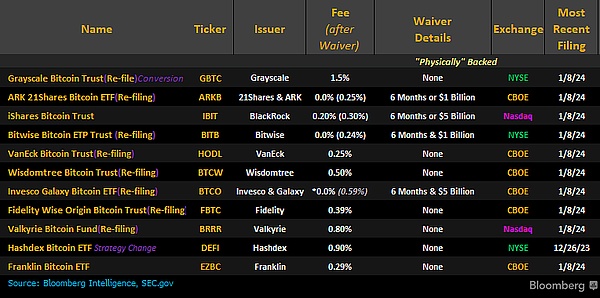Source: Blockchain Knight
This week is a high-profile week for the Crypto asset industry, with the approval of the BTC ETF application pending.
As the world’s largest asset managers vie for SEC (U.S. Securities and Exchange Commission) approval, their recently updated filings have sparked optimism in the Crypto asset community.
According to a report by FOX reporter Eleanor Terret,With the exception of global Crypto asset management company Hashdex, all issuers have successfully met the official deadline of 8 a.m. (January 8, US local time) Filed updated S-1 (Grayscale is S-3) with SEC.
Terret believes that unless Hashdex submits documents at the last minute, these issuers can theoretically launch their BTC ETF this week based on the preparation work they have completed.
Documents filed by Crypto asset issuers highlight steps taken to seek SEC approval. Bloomberg ETF expert James Seyffart introduces the fee structure and major updates.
In notable developments, Bitwise offers the lowest long-term fees at 0.24%, followed by VanEck at 0.25%. In addition, three ETFs received a six-month fee waiver.

p>
As can be seen from the chart shared by Seyffart, BlackRock's fees will be 0.20% for the first six months until assets reach $5 billion, after which they will increase to 0.30%.
Ark and 21Shares have fees of 0.25%, with no fees for the first six months or until assets reach $1 billion.
Grayscale, on the other hand, has filed an updated S-3 that reduces its fee from 2% to 1.5% and provides potential fee relief provisions.
The lower fees proposed by BTC ETF issuers may have some impact on investors and the entire Crypto asset industry.
First, lowering fees can increase investor participation and make investing in BTC ETFs more affordable. A wider range of investors, including retail investors, institutional investors and traditional asset managers, may be more inclined to allocate funds to these ETFs.
The increase in participation will lead to an increase in market liquidity and trading volume, thus promoting the overall development and maturity of the Crypto asset industry.
Second, lower fees provide cost savings to investors. With the fees associated with investing in BTC ETFs reduced, investors can keep a larger portion of their profits. This is especially beneficial to retail investors with limited financial resources.
Additionally, the introduction of lower fees through the BTC ETF fee war signals a shift towards greater market efficiency. This will improve the competitive environment as publishers compete to offer the most attractive fee structures.
This competition can drive innovation, improve product offerings, and further reduce expenses in the future. Ultimately, this will benefit investors by providing them with a wider range of investment options and more cost-effective investment vehicles.
Based on the SEC’s review of the latest filings and fee structures, the Crypto community is eagerly anticipating a decision that could pave the way for a BTC ETF and potentially shape the future of the entire Crypto industry.
The results of this regulatory milestone have the potential to open new avenues for institutional and retail investors, providing greater accessibility and legitimacy to the world of crypto assets.
 Alex
Alex
 Alex
Alex Alex
Alex Miyuki
Miyuki Weiliang
Weiliang Miyuki
Miyuki Anais
Anais Alex
Alex Miyuki
Miyuki Weiliang
Weiliang Alex
Alex